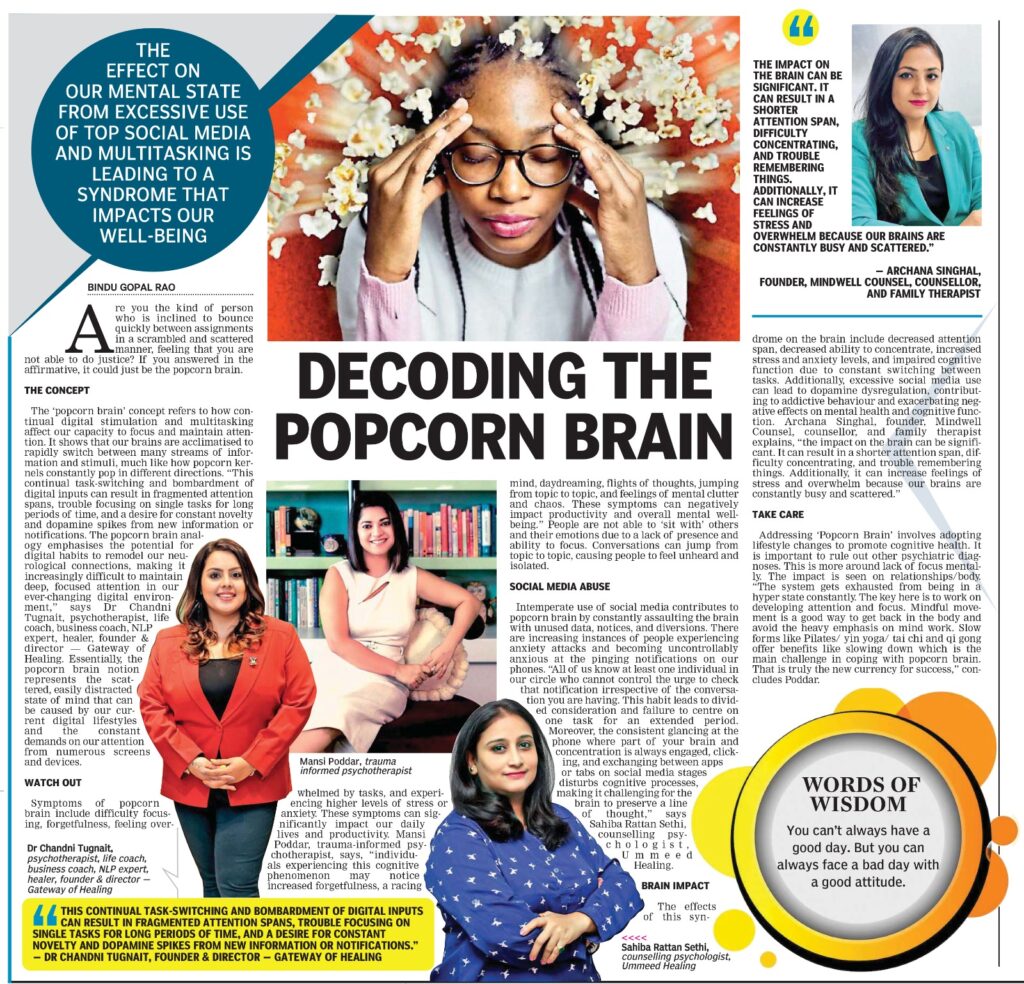
The concept of popcorn brain revolves around the impact of excessive social media use and multitasking on our minds. It’s like when your brain jumps around from one thought to another quickly, like popcorn popping in a pan. Excessive use of social media can lead to a popcorn brain because it bombards our brains with constant information and distractions. When we’re constantly glued to our phones or scrolling through social feeds, our brains adapt to rapidly switching tasks, which makes it challenging to focus on one thing for long periods.
Popcorn brain refers to a consequent condition where an individual’s attention span is significantly shattered due to excessive interaction with digital media. It’s characterized by an inability to focus on one task for a longer period and a tendency to constantly switch between tasks.
Constant updates from social media produces dopamine and wires the brain to seek constant pleasure. This dopamine can be addictive and that’s how we get stuck in the loop of doomscrolling.
Popcorn brain is mainly the inability of the brain to focus and stay present. It goes from idea to idea often lost in day dreams. But we must be cautious not to diagnose popcorn brain as ADHD. The difference is ADHD is also marked but impulsive and hyperactive behaviour vs PB which is more cognitive and a result of social media /internet.
The frequent switching between tasks, streams of information, and digital stimuli on social media platforms might have serious consequences for the brain’s structure and function. One significant result is a shortened attention span and the capacity to maintain focus on a single subject for a lengthy amount of time. The brain’s cognitive control processes, which oversee regulating attention and decision-making, might become stretched and ineffective because of the constant demands of multitasking across several social apps and material.
Some studies even show that excessive media multitasking may cause anatomical changes in the brain, such as decreased grey matter density in areas related to emotional processing and cognitive control. Furthermore, the constant dopamine hits from social media interactions and fresh information may disrupt the brain’s dopamine systems responsible for reward, motivation, and addiction. This can enhance distractibility, impulsivity, and the obsessive need to constantly check for fresh notifications and updates.
While additional long-term research is needed, the “popcorn brain” phenomenon caused by continuous digital stimulation appears to impair a variety of cognitive processes, including sustained attention, cognitive control, and self-regulation. It may stretch neuronal circuits and potentially alter brain structure, making it more difficult to focus, think deeply, and resist temptations and distractions in today’s digital world.
The goal is to intentionally incorporate intervals of concentrated engagement and digital detox into your daily routine while simultaneously addressing the underlying habits and compulsions that contribute to the “popcorn brain” issue. With constant effort, you can rewire your brain and reclaim control of your attention and focus.
Popcorn brain symptoms
- Forgetfulness: Difficulty remembering information or tasks due to constantly shifting attention.
- Difficulty concentrating: Difficulty concentrating on one task for a long time.
- Feeling overwhelmed: Feeling like you are inundated with information and tasks, leading to stress and anxiety.
- Increased stress levels: Increased feelings of tension and stress due to constant mental stimulation and the need to multitask.
- Inability to complete tasks effectively: Difficulty completing tasks due to distractions and inability to concentrate.
Tips
- Switch off the phone Workable Solution – Switch to analog phones and remove yourself from social media Practical Solution – Have phone free days, limit your phone usage time and be on social networks that are only absolutely necessary.
- Practice mindfulness and meditation that increases mental focus.
- Don’t multi-task. Take one thing at a time. Focus on one task at a time and be fully present in the moment, avoiding the temptation to multitask.
- Take up physical activities that engage your body and increase endorphins naturally.
- Seek professional help if needed. This is not a frivolous concern. If symptoms persist or have a significant impact on daily functioning, consider seeking advice from a mental health professional for personalized support and strategy.
Read the full story that first appeared in Deccan Chronicle dated June 4, 2024 here:

Leave a Reply